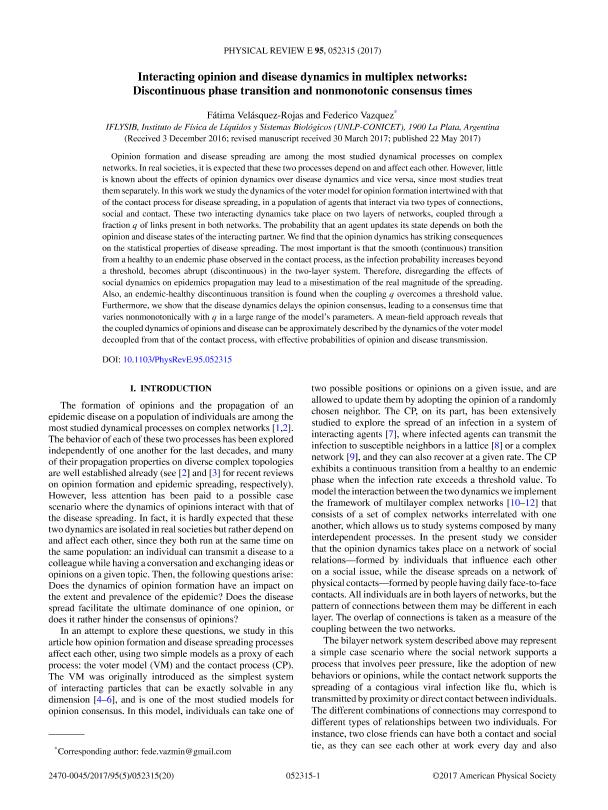Mostrar el registro sencillo del ítem
dc.contributor.author
Velasquez Rojas, Fatima Zoriana Eloisa

dc.contributor.author
Vazquez, Federico

dc.date.available
2018-06-08T21:14:29Z
dc.date.issued
2017-05
dc.identifier.citation
Velasquez Rojas, Fatima Zoriana Eloisa; Vazquez, Federico; Interacting opinion and disease dynamics in multiplex networks: Discontinuous phase transition and nonmonotonic consensus times; American Physical Society; Physical Review E; 95; 5; 5-2017; 1-20; 052315
dc.identifier.issn
2470-0045
dc.identifier.uri
http://hdl.handle.net/11336/48017
dc.description.abstract
Opinion formation and disease spreading are among the most studied dynamical processes on complex networks. In real societies, it is expected that these two processes depend on and affect each other. However, little is known about the effects of opinion dynamics over disease dynamics and vice versa, since most studies treat them separately. In this work we study the dynamics of the voter model for opinion formation intertwined with that of the contact process for disease spreading, in a population of agents that interact via two types of connections, social and contact. These two interacting dynamics take place on two layers of networks, coupled through a fraction q of links present in both networks. The probability that an agent updates its state depends on both the opinion and disease states of the interacting partner. We find that the opinion dynamics has striking consequences on the statistical properties of disease spreading. The most important is that the smooth (continuous) transition from a healthy to an endemic phase observed in the contact process, as the infection probability increases beyond a threshold, becomes abrupt (discontinuous) in the two-layer system. Therefore, disregarding the effects of social dynamics on epidemics propagation may lead to a misestimation of the real magnitude of the spreading. Also, an endemic-healthy discontinuous transition is found when the coupling q overcomes a threshold value. Furthermore, we show that the disease dynamics delays the opinion consensus, leading to a consensus time that varies nonmonotonically with q in a large range of the model’s parameters. A mean-field approach reveals that the coupled dynamics of opinions and disease can be approximately described by the dynamics of the voter model decoupled from that of the contact process, with effective probabilities of opinion and disease transmission.
dc.format
application/pdf
dc.language.iso
eng
dc.publisher
American Physical Society

dc.rights
info:eu-repo/semantics/openAccess
dc.rights.uri
https://creativecommons.org/licenses/by-nc-sa/2.5/ar/
dc.subject
Multiplex Networks
dc.subject
Opinion Formation
dc.subject
Disease Spreading
dc.subject.classification
Otras Ciencias Físicas

dc.subject.classification
Ciencias Físicas

dc.subject.classification
CIENCIAS NATURALES Y EXACTAS

dc.title
Interacting opinion and disease dynamics in multiplex networks: Discontinuous phase transition and nonmonotonic consensus times
dc.type
info:eu-repo/semantics/article
dc.type
info:ar-repo/semantics/artículo
dc.type
info:eu-repo/semantics/publishedVersion
dc.date.updated
2018-06-08T14:25:57Z
dc.journal.volume
95
dc.journal.number
5
dc.journal.pagination
1-20; 052315
dc.journal.pais
Estados Unidos

dc.description.fil
Fil: Velasquez Rojas, Fatima Zoriana Eloisa. Consejo Nacional de Investigaciones Científicas y Técnicas. Centro Científico Tecnológico Conicet - La Plata. Instituto de Física de Líquidos y Sistemas Biológicos. Universidad Nacional de La Plata. Facultad de Ciencias Exactas. Instituto de Física de Líquidos y Sistemas Biológicos; Argentina
dc.description.fil
Fil: Vazquez, Federico. Consejo Nacional de Investigaciones Científicas y Técnicas. Centro Científico Tecnológico Conicet - La Plata. Instituto de Física de Líquidos y Sistemas Biológicos. Universidad Nacional de La Plata. Facultad de Ciencias Exactas. Instituto de Física de Líquidos y Sistemas Biológicos; Argentina
dc.journal.title
Physical Review E
dc.relation.alternativeid
info:eu-repo/semantics/altIdentifier/doi/https://dx.doi.org/10.1103/PhysRevE.95.052315
dc.relation.alternativeid
info:eu-repo/semantics/altIdentifier/url/https://journals.aps.org/pre/abstract/10.1103/PhysRevE.95.052315
Archivos asociados
